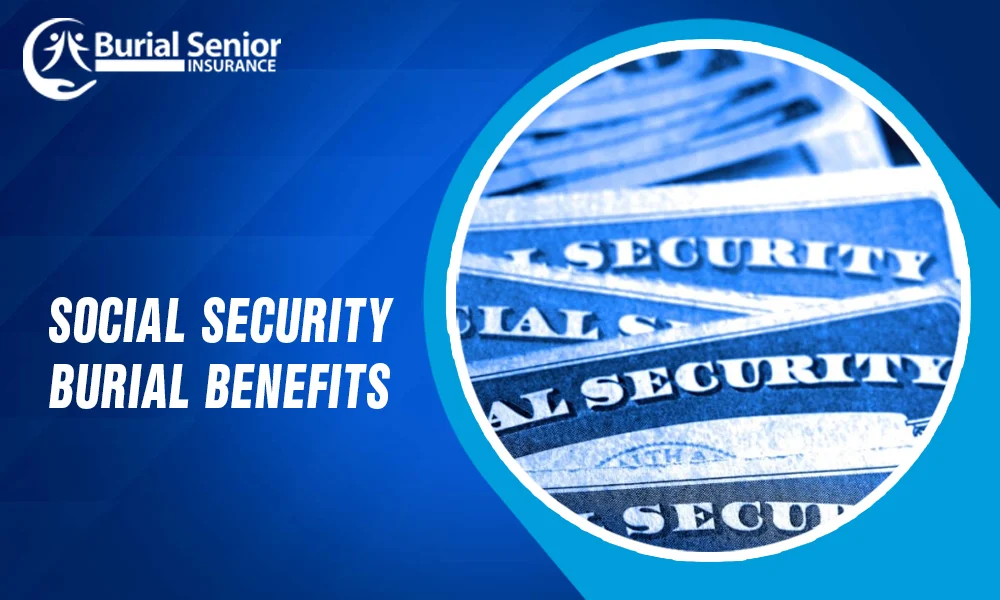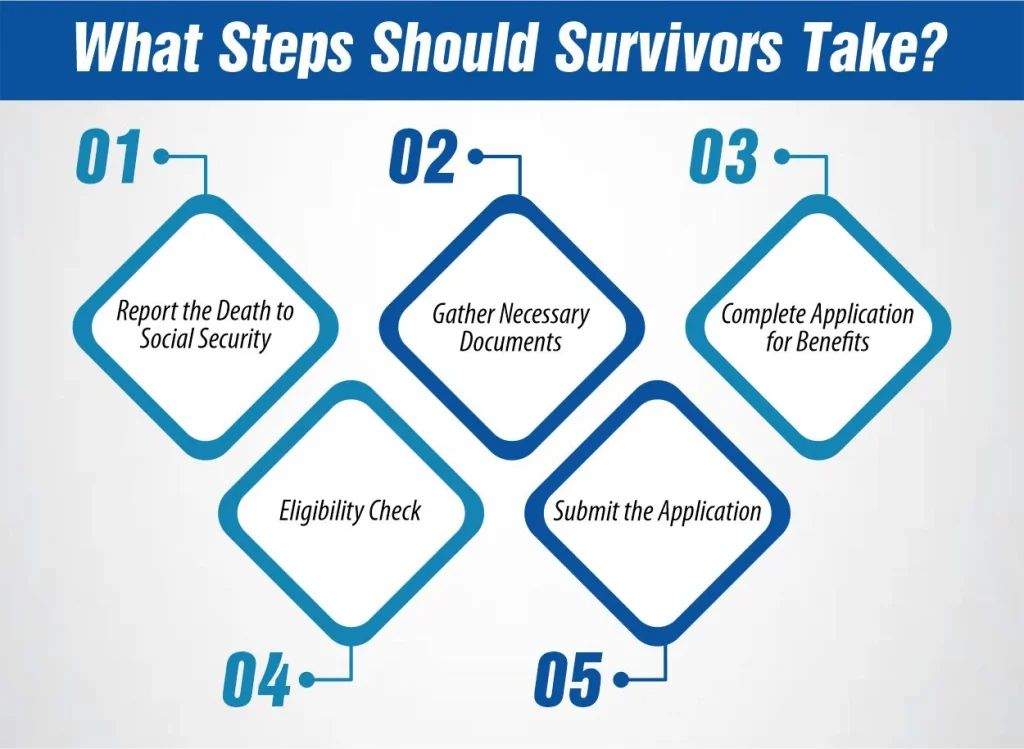Social Security Burial Benefits: Support for Funeral Costs
Last Updated on: March 14th, 2025
Reviewed by Kyle Wilson
- Licensed Agent
- @ Burial Senior Insurance

When planning for the future, it’s important to consider all aspects of end-of-life arrangements, including Social Security burial benefits. The Social Security Administration pays a one-time, Special Benefit payment to help with burial expenses after the death of a Social Security beneficiary. This is known as the Social Security burial benefit or death benefit. To qualify for this payment, there are some basic conditions that you have to fulfill. For instance, one must have contributed to Social Security or be a dependent of the contributor, be it as a spouse or a child. Let’s discuss more about it.
Get Free Quotes
Customized Options Await
What Are Social Security Death Benefits?
Social Security Death Benefits are provided to the surviving spouses, children, and other dependents of a deceased eligible employee. This benefit, designed to ease the financial strain the loss of one’s spouse or parent puts on the family, is especially useful for families with young children.
The monthly benefit amount depends on the earnings of the deceased person. In other words, if they contributed to Social Security more, their benefits would also be more. This amount is a percentage of the deceased’s basic social security benefit or his average earnings over a period.
Also, depending on the situation of the death, the benefit of a one-time lump-sum death payment of $255 may be paid to the surviving spouse if he or she was living with the deceased person; or if living apart, was receiving certain kinds of Social Security benefits on the deceased’s record. When there is no surviving spouse, the payment is made to a child who qualifies for the benefits.
Who is Eligible to Receive Social Security Death Benefits?
- Any woman or man with no spouse and above the age of 60 years
- A surviving divorced spouse, under certain conditions
- Any widow or widower at any age who is looking after the deceased’s child under 16 years of age or is disabled and receives child benefits.
- An unmarried child of the deceased who is one of the following
- Under the age of eighteen (up to nineteen if he or she attends elementary or secondary school as a full-time student).
- People above 18 years of age with a disability that affected them before they reached 22 years of age.
Does Medicare or Social Security Pay for Funeral Expenses?
The short answer to this question is no; they don’t. Medicare covers medical care, which ends when you die. Medicare doesn’t have a death benefit either, but Social Security does offer burial benefits.
The Social Security Administration will give a one-time $255 payment to a surviving spouse or child, called a special lump-sum death payment.
You do have to meet certain requirements:
- The spouse must have been living with the deceased or receiving certain social security benefits on the deceased’s record.
- If there’s no surviving spouse, the payment goes to a child eligible for benefits on the deceased’s record in the month of death.
After seeing how much a funeral can cost, you realize that $255 from Social Security is a nice gesture, but it will only cover a few floral arrangements.
Who can claim benefits from my record?
Burial benefits are divided into two categories: those that kick in before a worker’s death and those that go to the worker’s survivors. The second kind of benefits are often called survivor or Social Security burial benefits. Here are the rules:
While you’re alive, your spouse and any ex-spouse(s) become eligible to claim spousal benefits from your record, beginning when they turn 62. For your husband or wife to claim Social Security spousal benefits (equal to 50% of your benefit) you must have already claimed your primary benefits. Divorced spouses, though, can begin claiming benefits on their ex’s record whether or not the ex has filed for retirement benefits.
Minor children and disabled children of any age who became disabled before age 22 are also eligible to receive benefits if their retired parent has started claiming primary benefits.
After a worker eligible for primary Social Security benefits dies, a few classes of protected individuals are entitled to claim Social Security Burial Benefits (equal to 100% of the deceased’s benefits). The folks with this kind of Social Security eligibility include:
- Surviving spouses (a.k.a. widows and widowers) married for at least 10 years, who can start collecting reduced benefits when they turn 60 and full survivor benefits at full retirement age
- Surviving divorced spouses married for at least 10 years, who can collect reduced benefits from age 62 and full benefits at their full retirement age, provided they don’t remarry.
- Dependent parents, if the worker’s financial support made up at least half of their support
- Minor children up to age 18, or up to age 19 if still in secondary school
- Adult children if disabled before age 22
- The mother or father of the deceased’s children (including an ex-spouse), who is caring for the deceased’s minor children, can claim Social Security death benefits until the children reach age 16.
Can my surviving spouse claim my Social Security burial benefits and their primary benefits?
These benefits were designed to protect the non-working spouses and children of workers, not to provide extra money to surviving spouses whose work histories make them eligible for benefits on their record.
A surviving spouse whose age and labor force participation make them eligible for primary Social Security benefits should not expect to receive full Social Security death benefits on top of their check. The Social Security Administration wants to guard against what it considers “excess benefits,” so will adjust the benefits of anyone who is eligible for both spousal/death benefits AND primary benefits.
Social Security will pay out the larger of either the spousal/survivor benefits or the primary benefits, but not both. This is known as the Dual Entitlement Rule. So, if you consistently earned more than your spouse and your spouse predeceases you while you’re both claiming Social Security, you won’t get an income boost because your primary Social Security benefits are greater than the death benefits you’re eligible for.
If you’re a widow or widower you’re eligible to claim death benefits beginning at age 60, or age 50 if you’re disabled. You can claim benefits while letting your benefits grow until you reach age 70. Alternatively, you can claim your benefits beginning at age 62 and wait until later to claim auxiliary benefits.

What Steps Should Survivors Take?
To apply for Social Security burial benefits, survivors should follow these steps:
Report the Death to Social Security
Contact the SSA immediately so you can inform them about the death. The funeral homes may do this if they have the Social Security number of the deceased.
Gather Necessary Documents
The necessary papers include the social security number of the deceased, the death certificate, proof of the relation between the deceased and the claimant (marriage certificate in the case of the spouse), and proof of the identity of the claimant.
Complete Application for Benefits
To claim this benefit, survivors must secure a one-time payment of $255. This can be done by making a phone call to the SSA or arranging an appointment with one of its offices. Note: It is important to note that one cannot apply for burial benefits online.
Eligibility Check
It is necessary to determine whether the situation with the surviving spouse or dependent children meets the requirements for receiving benefits. This benefit is only available to specific relations, including a surviving spouse, dependent children, or any other dependents.
Submit the Application
The completed application and the necessary documents must be given directly to the SSA office or by mail.
How Social Security burial benefits Helps Families?
Social Security burial benefits assist in reducing the economic loss that results from the death of the workers. Nearly all minor dependents under the age of eighteen will receive a monthly payment if a working parent dies. The bad news is that other members of the family may also qualify for such benefits. Everyone who has been earning and paying Social Security or FICA taxes for his or her family has been earning Social Security benefits. The effort that a worker contributes to qualify for the survivor benefits varies with the worker’s age at the time of death.
How to Apply for Benefits
You can apply for benefits by telephone or by going to the Social Security Office. You may need some of the documents shown on the list on the reverse side of this sheet. Don’t delay your application if you don’t have all the information. Social Security can help you get required documents you may not have.
Information Needed
- Your Social Security number and the deceased’s Social Security number.
- A Certified Death Certificate
- Proof of the deceased’s earnings for the last year (W-2 form or self-employment tax return).
- Your Birth Certificate.
- A Marriage Certificate if applying for benefits as a widow/widower or divorcee.
- A divorce decree if applying for benefits as a divorcee.
- Children’s Social Security numbers and birth certificates if applying for children’s benefits.
- Bank account numbers if benefits will be paid through direct deposit.
You will need to submit original documents or copies certified by the issuing office. Social Security will make photocopies and return your original documents.
Conclusion
The Social Security burial benefits are helpful in a way it offers some amount of money to families after the death of a family member. However, the payment is little and may not afford all the necessary funeral arrangements. Thus, it is crucial to know about the eligibility criteria and how to apply for this benefit in case of a necessity. It also may be useful to look into other funeral cost assistance programs for use to supplement the Social Security death payment.
Senior Writer & Licensed Life Insurance Agent
Iqra is a dynamic and insightful senior writer with a passion for life insurance and financial planning. With over 8 years of hands-on experience in the insurance industry, Iqra has earned a reputation for delivering clear, actionable advice that empowers individuals to make informed decisions about their financial future. At Burial Senior Insurance, she not only excels as a licensed insurance agent but also as a trusted guide who has successfully advised over +1500 clients, helping them navigate the often complex world of life insurance and annuities. Her articles have been featured in top-tier financial publications, making her a respected voice in the industry.


